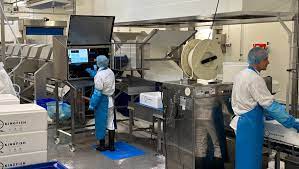
The land-based yellowtail kingfish farmer said that, following this opening, the leased processing facility in Colijnsplaat, in use since 2017, will be shut down.
How does the new facility operate?
As mentioned, the brand-new processing facility inaugurated this week is directly connected to the fish farm so the yellowtail kingfish can be transported from the tanks to the plant using a specially designed fish pump that ensures gentle transport.
Once at the packing and processing plant, the fish are electrocuted and cooled to 1-2 C using three refrigeration tubes, then gutted, graded, packed, and iced. The boxes are then moved to an order-preparation area until they are loaded onto trucks. Some of the fish can also be filleted and packed in a high-care area.
The Kingfish Company stresses that the plant is designed to maintain the highest product hygiene and food safety standards. In an e-mail sent to WeAreAquaculture, the company summarized the process in this sentence: "Fish harvested at 4 am will leave to customers in Europe, the Middle East and North America later the same day."
Improved conditions for both the fish and the team
Reduced fish handling and an even shorter supply chain are some of the highlights of The Kingfish Company's new facility in Zeeland, but not the only ones. The land-based yellowtail kingfish farmer has also emphasized that the new plant offers improved ergonomics for the team.
With a total of 20 employees, the plant can process up to 3,500 tons per year, but its capacity exceeds 6,500 MT per year, allowing for further expansion of the operation. In fact, the company recently announced that Phase 2 of the expansion had been completed and was fully operational before the end of December. CEO Vincent Erenst stated at the time that this milestone marked the beginning of an accelerated sales phase to which this state-of-the-art in-house packaging and processing plant will now contribute.
"I am very pleased with the completion and start up of our new processing plant which will ensure the highest standards of humane harvesting of fish, as well as excellent product quality and food safety, while providing excellent ergonomic conditions for our employees," Erenst said this week during the plant's small opening ceremony.



